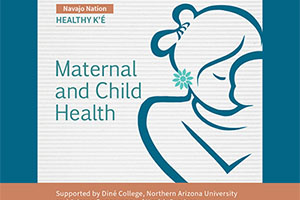Healthy Navajo K’é podcast brings maternal and child health talks to the Navajo Nation

Creating an effective maternal and child health (MCH) podcast on the Navajo Nation requires more than just important health information—it involves having compelling hosts, effective guests, excellent editing and a style to which the audience can relate.
The Healthy Navajo K’é podcast meets all these criteria and then some. For its first episode on oral care for mothers and children on the Navajo Nation, hosts Amber-Rose Waters, Diné College project coordinator, and Jamie Wilson, Northern Arizona University research associate, interviewed Nicole Nelson, D.D.S., a Diné dentist at Zuni Comprehensive Health Center in New Mexico.
Wilson and Nelson went to high school together and with easy rapport and frank answers, they discuss the benefits of caring for baby teeth, pregnant women practicing good oral hygiene and visiting dental clinics for regular checkups. Their candid discussion targets a general audience, not only women.
“In Diné ways, we don’t think of the mother and the child, we think of the whole family unit,” Waters said. “… We have some multi-generational homes. They all have a role in taking care of children, and there are lessons they teach their children that can only come from them. We want to be mindful of that.”
Diné College, a Tribal College of the Navajo Nation, and NAU collaborate together through the Navajo Native American Research Center (NARCH) for Health Partnership.
Prior to developing their first podcast, the Navajo NARCH team created the first 2020 Navajo Nation Maternal and Child Health Needs Assessment for the Arizona Department of Health Services, Bureau of Women’s and Children’s Health, as part of their quintennial Arizona Maternal-Child Health Needs Assessment.
From that work, the NARCH team received funding from a Maternal and Child Health Services Block Grant through the Arizona Department of Health Services to build programs that would reach the Navajo Nation with maternal and child health messages.
After evaluating several options, the NARCH team determined that the best way to reach Diné caregivers on the Navajo Nation, such as parents, grandparents, aunts and uncles, was to produce public service messages on local radio stations KTNN and KNDN. The team decided to produce podcasts based on the health priorities outlined in the Navajo MCH assessment.
“For infant health, the top health priorities [from the Navajo MCH assessment] were low birth weight and mortality; for child health, the priorities were mortality and unintentional injuries; for adolescent health, the top priorities were mental health; and for maternal health the top priorities were prenatal care begun in the first trimester and adequate prenatal care,” Waters said. “These are topics that we can shed light on through this podcast and help community members, Navajo MCH specialists and tribal leaders understand and address.”
In addition to oral health, other topics they plan to address through the podcast include prenatal care, breastfeeding, nutrition and gestational diabetes. Through guest speakers, they hope to highlight services and provide culturally relevant information specific to Navajo families.
“I hope our audience, whether they are a mother, father, grandparent, providers, or nurses, realize the importance of health especially for pregnant or lactating women and the child that is to be born,” Waters said. “From before conception to postpartum, a woman goes through so much physically, emotionally and spiritually and the more support she has from her partner, family, friends, providers, and nurses, the better the outcome.”
Navigating a remote podcast team
Though Waters and the Diné College staff are located in Shiprock, New Mexico, the MCH podcast editing team are mostly located in Flagstaff and other areas of Arizona.
“I thought that would be a challenge but I feel like it’s been pretty easy to plan as a team,” Waters said. “We share information on a topic and record. We used Zoom or our phones to record our voice, and to invite and collaborate with our guest speakers.”
Chassity Begay, DeeDee James and Shermaine Nelson, NAU students, are assisting with podcast editing.
James, a second-year student in the NAU Master of Public Health, Indigenous Health Track, has been working on the project since this summer. Though she had never edited a podcast before, she trained herself by watching tutorials.
“In the beginning it was a little hard,” James said. “It was a learning process. Although it is tedious, I really like it a ton.”
For her part in the podcast editing, Begay said she is listening to interviews and removing pauses and extra words to make the final product smoother.
“I have never made a podcast—it is fairly new to me—but I thought it would be a lot harder,” said Begay, who is also a student in NAU’s Master of Public Health, Indigenous Health Track. “I think it is a good skill to have. A lot of people are starting to put together podcasts. The idea of a podcast is starting to pick up.”
Nelson, who will graduate in December with a bachelor’s degree in health equity, had difficulty with computer compatibility in the beginning of the project, but quickly began working once she had the correct equipment.
“Although I enjoyed interviewing and speaking, it was a challenge for me as it is out of my comfort zone,” Nelson said. “I enjoyed working on the transcript and working with the editing software. Overall, I am grateful I have the opportunity to be working on this podcast.”
The podcast team has many innovative program plans for the future.
“Currently, we have five podcasts lined up but in order to ensure that we continue this podcast with our NAU undergrad and grad students, and Diné College undergraduate students, we want to expand the topics to an overall public health and family focus on the Navajo Nation,” Waters said. “We want this to be a sustainable and student-led podcast [series], because we know this is one way we can continue to share health information.”
The Healthy Navajo K’é podcast is available on BuzzSprout, Apple Podcasts and Spotify.